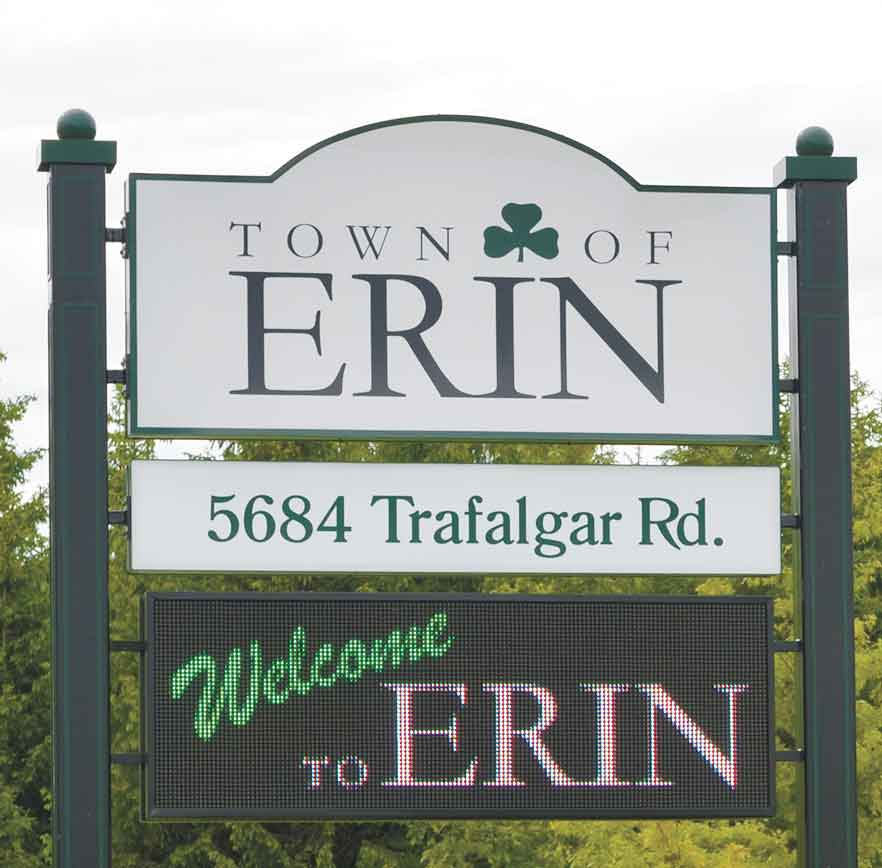ERIN – Erin council has approved a zoning bylaw change it hopes will pave the way for the construction of a wastewater treatment facility just outside town, despite objections from Wellington County.
Among the housekeeping bylaw changes considered by council on March 3 was one that allows a “wastewater treatment facility” to be an approved land use in any zone – in the same way wells, sanitary sewers, water treatment facilities and telephone lines are allowed.
In comments on the zoning bylaw amendment, Wellington County planners stated the town needs to amend its official plan – and so does the county – to permit a wastewater treatment facility in Erin.
“As part of the report Planning Approval for Future Growth in the Town of Erin prepared by county planning staff for the town in 2018, council was advised that town and county Official Plan amendments were required to permit a waste water treatment facility,” states the county report.
However, the Town of Erin sought a legal opinion from Toronto law firm Loopstra Nixon LLP, which argued the town is not required to amend the official plan to build a wastewater facility.
It cited Section 3.7 (c) of the town’s official plan, that essentially allows the town, county, province and the government of Canada to build a public facility in any zone as long as it satisfies provisions of the Environmental Assessment Act and the Environmental Protection Act.
“The development of a [wastewater treatment facility] clearly falls within this section, upon completion of the applicable Environmental Assessment and zoning amendment,” the lawyers’ report states.
The environmental assessment was approved last year by the Ministry of the Environment, Conservation and Parks.
Loopstra Nixon also argued that Wellington County’s official plan is flexible and doesn’t expressly prohibit development of a wastewater facility in Erin.
“No official plan can hope to anticipate all the varied circumstances that may arise in a changing community,” the legal report states, quoting the county’s official plan
The legal report adds that developing a wastewater treatment facility does reflect the “spirit and intent” of the county’s broader policies and objectives.
Noting the discrepancy between the county’s report and the Loopstra Nixon opinion, councillor John Brennan asked if it would be better to have language in the official plan specifically related to the wastewater facility.
CAO Nathan Hyde said staff is about to begin an official plan review that will likely speak specifically to the facility, but a bylaw amendment now will expedite the project.
“We will look at the official plan as it relates to this approach,” Hyde said.
“But we can take the long way or the quicker route. Under this circumstance (the bylaw amendment) we can move forward.”
“Maybe we can, but why would we want to?” asked councillor Michael Robins. “We don’t want to get ahead of our headlights… I’m concerned we’re moving ahead too early.”
Mayor Allan Alls expressed confidence in the advice of the legal team.
“I’m very confident that doing this won’t put us in jeopardy,” he said.
All councillors voted in favour of the bylaw amendment except Robins, who abstained.
The county has 20 days to respond to the bylaw amendment.
In a subsequent interview, communications officer Jessica Spina said there are a lot of moving parts to the project.
The town has identified a preferred site on the northwest corner of Wellington Road 52 and 10th Line, but the land has not yet been purchased.
And while it has been decided developers will front the cost of construction of the facility and that new subdivisions will be the first homes to hook up to the system, those costs have not been nailed down and there has been no decision on which new subdivision will go first.
Spina said the town is seeking provincial and federal funding and how much, if any, they receive will impact costs to developers and to homeowners.
“I know it’s confusing for residents,” Spina said.
“They want to know how the numbers will impact them and we just don’t know yet.
“We’re trying to be proactive. As we waited for the environmental assessment, we went ahead with financing studies. We’re talking with provincial and federal governments about funding. We want to be ready to get going as soon as we can.
“And at the end of the day we want to provide a great service that’s affordable for residents.”
The housekeeping bylaw passed last week by council also amends the definitions of terms like building height, bed and breakfast establishment, permitted uses in mixed use zones, and rules and terminology around medical cannabis production facilities.




